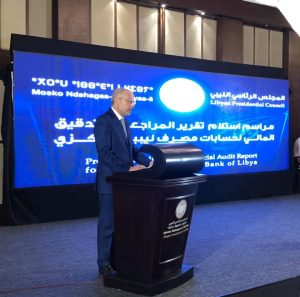By Sami Zaptia.

London, 8 July 2021:
Central Bank of Libya (CBL) Governor Saddek El-Kaber welcomed the handing over of the CBL audit report and emphasized that the CBL is a sovereign institution that adheres to the standards of transparency, responsibility and disclosure.
El-Kaber was speaking at the report handing-over ceremony at a Tripoli hotel today hosted by the Presidency Council of the Government of National Unity (GNU).
“The CBL has maintained its neutrality and professionalism under critical political circumstances, imposed by an institutional division in which the Central Bank has no stake.”, he added.
The CBL said that since April 2016 it has called for a review and examination of its work as a ground to unify the institution and end the divide and the distortions and repercussions caused by it.
This commitment to the principles of transparency, responsibility and disclosure has been behind the CBL’s welcoming of and support for the launch of the International Audit process. To complete the audit process, the Governor tasked a team of CBL specialists to work closely with the International Auditor and provided the required data and information in coordination with the Attorney General’s Office, the CBL added.
With the audit now complete, the CBL said it is pursuing its main objective of unifying the Central Bank by beginning to implement the necessary, practical measures outlined in the audit report. The CBL has also prioritized maintaining the integrity of the banking sector and supporting the exchange rate policy adopted by its Governing Council earlier this year of January 2021.
The CBL said that despite the exceptional circumstances over the past seven years, the CBL has successfully maintained its network of foreign partnerships and intermediary relationships, liaised and coordinated with international institutions, and promoted transparency and disclosure. It has also met international standards and requirements for Anti-Money Laundering and Counter Terrorism Financing, which has led to Libya’s removal from the grey list of the Financial Action Task Force (FATF), it added.
The CBL said it had also ensured the financial stability of the State, maintaining the Libyan Dinar’s value (particularly when compared to currencies of countries that experienced similar economic hardship), and steered the country away from economic and financial meltdown.
The CBL said that the Governor and board directors of the CBL are confident that the relative stability achieved since the Government of National Unity took charge is a historic opportunity to deliver many more achievements. Looking ahead to the rest of the year, the CBL will launch a number of strategic projects aimed to enhance transparency and disclosure, strengthen regulatory and supervisory frameworks, develop electronic payment services, prepare proposals for cyber legislation, and provide liquidity to all parts of Libya. The CBL will also invest in capacity-building and other projects that will enhance the Bank’s ability to implementing and deliver these desired results.
Welcoming the receipt of the International Audit Report, the CBL said it will review its recommendations and continue to liaise with UNSMIL to ensure the maximize benefit is derived from the work. The CBL also commended the intensification of efforts of all stakeholders towards the unification of the Central Bank.
The reunification of the CBL will benefit every facet of the Libyan economy, help to rebuild the country and contribute to the improvement of living conditions of citizens across all parts of Libya. It will also boost Libya’s foreign trade partners by providing them with greater banking certainty and lower risk, the CBL concluded.








